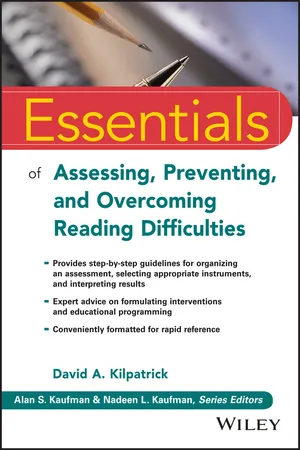
Essentials of Assessing, Preventing, and Overcoming Reading Difficulties
- English
- ePUB (mobile friendly)
- Available on iOS & Android
Essentials of Assessing, Preventing, and Overcoming Reading Difficulties
About this book
Practical, effective, evidence-based reading interventions that change students' lives
Essentials of Understanding and Assessing Reading Difficulties is a practical, accessible, in-depth guide to reading assessment and intervention. It provides a detailed discussion of the nature and causes of reading difficulties, which will help develop the knowledge and confidence needed to accurately assess why a student is struggling. Readers will learn a framework for organizing testing results from current assessment batteries such as the WJ-IV, KTEA-3, and CTOPP-2. Case studies illustrate each of the concepts covered. A thorough discussion is provided on the assessment of phonics skills, phonological awareness, word recognition, reading fluency, and reading comprehension. Formatted for easy reading as well as quick reference, the text includes bullet points, icons, callout boxes, and other design elements to call attention to important information.
Although a substantial amount of research has shown that most reading difficulties can be prevented or corrected, standard reading remediation efforts have proven largely ineffective. School psychologists are routinely called upon to evaluate students with reading difficulties and to make recommendations to address such difficulties. This book provides an overview of the best assessment and intervention techniques, backed by the most current research findings.
- Bridge the gap between research and practice
- Accurately assess the reason(s) why a student struggles in reading
- Improve reading skills using the most highly effective evidence-based techniques
Reading may well be the most important thing students are taught during their school careers. It is a skill they will use every day of their lives; one that will dictate, in part, later life success. Struggling students need help now, and Essentials of Understanding and Assessing Reading Difficulties shows how to get these students on track.
Frequently asked questions
- Essential is ideal for learners and professionals who enjoy exploring a wide range of subjects. Access the Essential Library with 800,000+ trusted titles and best-sellers across business, personal growth, and the humanities. Includes unlimited reading time and Standard Read Aloud voice.
- Complete: Perfect for advanced learners and researchers needing full, unrestricted access. Unlock 1.4M+ books across hundreds of subjects, including academic and specialized titles. The Complete Plan also includes advanced features like Premium Read Aloud and Research Assistant.
Please note we cannot support devices running on iOS 13 and Android 7 or earlier. Learn more about using the app.
Information
Chapter One
Introduction
The Unfair Race
Don't Forget
Don't Forget
The Importance of Reading
Table of contents
- Cover
- Title Page
- Copyright
- Table of Contents
- Dedication
- Series Preface
- Preface
- Acknowledgments
- Chapter One: Introduction
- Chapter Two: How We Teach Reading and Why It Does Not Work With Struggling Readers
- Chapter Three: A Practical Framework for Understanding and Assessing Reading Skills
- Chapter Four: Understanding Word Recognition Difficulties
- Chapter Five: Understanding Reading Comprehension Difficulties
- Chapter Six: Assessing Phonological Processing Skills
- Chapter Seven: Assessing Phonics Skills
- Chapter Eight: Assessing Word Identification and Reading Fluency
- Chapter Nine: Assessing Reading Comprehension and Related Skills
- Chapter Ten: Effective Approaches for Preventing Reading Difficulties
- Chapter Eleven: Effective Approaches for Overcoming or Minimizing Reading Difficulties
- Chapter Twelve: Case Illustrations
- Chapter Thirteen: Reading Difficulties and Learning Disability Identification
- Afterword
- Glossary
- Further Reading
- References
- About the Author
- About the Online Resources
- Index
- End User License Agreement